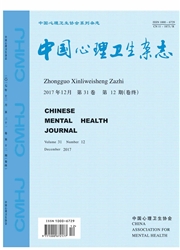

 中文摘要:
中文摘要:
目的:探索脑损伤对自我控制的影响。方法:本研究应用经典的自我延迟满足实验对癫痫幼儿和正常幼儿的自我控制行为进行比较研究。受试包括来自大连市内医院记录在案的9名癫痫幼儿和来自大连市普通幼儿园的36名正常幼儿(年龄为4~5岁)。结果:癫痫组幼儿的平均延迟时间短于正常组幼儿[(76±75)s vs.(591±308)s,P〈0.001]。在11种延迟策略由低到高的4种水平上,癫痫幼儿在水平Ⅱ寻求策略和水平Ⅲ自我分心、问题解决策略上得分均低于正常幼儿[(2.11±2.42) vs.(24.33±20.56),(2.11±2.62) vs.(12.69±11.79);均P〈0.001]。在水平Ⅱ上,癫痫幼儿寻求母亲和寻求目标得分均低于正常幼儿[(0.67±0.87) vs.(2.83±3.90),(1.44±1.88) vs.(21.50±19.13);均P〈0.01];在水平Ⅲ上,动作分散和静坐得分低于正常幼儿[(1.22±1.72)vs.(11.33±10.18);(0.22±0.67) vs.(2.56±4.91),均P〈0.01]。结论:癫痫引起的大脑损伤导致癫痫幼儿自我延迟满足能力的发展水平明显滞后于正常同龄幼儿,癫痫幼儿带有明显的低自我控制倾向。
 英文摘要:
英文摘要:
Objective: To explore the relationship between cerebral damage and self-control. Methods: The subjects included 9 children with epilepsy from a hospital and 36 normal children from a general kindergarten, and all of them were aged 4 - 5 years. Their self-control capacities were compared by self-imposed delay of gratification task Result: The children with epilepsy had shorter delayed time than the normal group [ (76 ±75) s vs. (591 ± 308 ) s, P 〈 0. 001 ] . Among 11 strategies of four levels, the epilepsy children had lower scores compared with the normal group in the pursuant strategies of level Ⅱ and in the self-distraction and problem-solving strategies of level Ⅲ [ (2.11±2.42) vs. (24.33±20.56), (2.11±2.62) vs. (12.69±11.79); P〈0.001] . Children with epilepsy had much lower scores than the normal group both in pursuant mother and pursuant target of level Ⅱ strategies[ (0.67±0.87) vs. (2.83±3.90), (1.44±1.88) vs. (21.50±19.13); P〈0.01] . They also had much lower scores than the normal group in action distraction and silent sitting of level Ⅲ strategies [ ( 1.22 ± 1.72 ) vs. (11.33±10.18); (0.22±0.67) vs. (2.56±4.91), P〈0.01] .Conclusion: Compared with normal children at the same age, children with epilepsy have lower self-control tendency, which may be related to the cerebral damage caused by epilepsy.
 同期刊论文项目
同期刊论文项目
 同项目期刊论文
同项目期刊论文
 期刊信息
期刊信息
